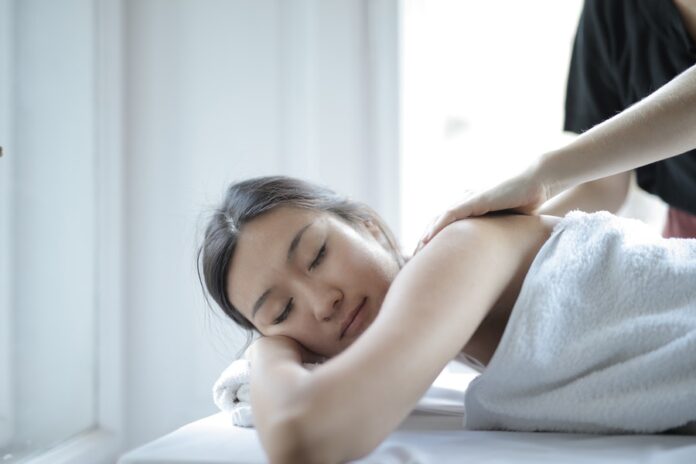The power of essential oils combined with massage therapy makes aromatherapy massage one of the most popular treatments on the spa menu. Aromatherapy massages are performed using fragrant essential oils and carrier oils, such as sweet almonds, jojoba, or grapeseed. Herbs, trees, and flowers are the sources of essential oils, and each oil possesses its own therapeutic properties.
When essential oils are absorbed through your skin, they penetrate your body. According to the type of essential oil used, these oils can benefit both your body and mind, improving your mood, relieving pain, and detoxifying your body. Essential oils come in cosmetic packaging boxes that increase their shelf life.
Aromatherapy massages are often accompanied by the diffused aroma of essential oils. Aromas of essential oils are detected by sensors in your nose that reach the limbic system in your brain, which is responsible for controlling emotions. Breathing essential oils will thus directly affect your mood. Some essential oil blends for massage therapy are also used to enhance the effect.
Benefits of Aromatherapy
An aromatherapy session is a complementary therapy. Aromatherapy does not cure diseases, rashes, or illnesses, but can support conventional treatments for these conditions. Including aromatherapy in your regular maintenance massage can have a major impact.
The benefits of aromatherapy are listed below:
- Aromatherapy oils can be applied to the skin to relieve muscle pain and increase lymphatic circulation, as well as boost your circulatory and immune systems. It may also help relieve the symptoms of a cold or flu.
- The use of aromatherapy massage has also been found to reduce headaches, depression, anxiety, PMS symptoms, and menstrual cramps. As a bonus, aromatherapy can aid in relaxation during a massage as well.
- Psoriasis sufferers may benefit from aromatherapy, but a medical professional should guide it.
- Clove oil can relieve toothache and mouth sores, but it should only be applied topically rather than swallowed.
Oils used in aromatherapy
- Jasmine essential oil-
Jasmine essential oil is considered an aphrodisiac. The odor of jasmine is linked to increased beta waves, which are linked to alertness, although no scientific evidence exists. The stimulant properties of jasmine might cause penile blood flow to increase.
- Chamomile essential oil-
Chamomile essential oil can be useful in treating digestive issues, soothing skin irritation, and calming inflammation. Chamomile is typically used for treating insomnia and enhancing sleep.
- Basil essential oil-
Basil essential oil can help improve concentration as well as improve some symptoms of depression. This oil also soothes headaches and migraines. It is not recommended during pregnancy.
- Eucalyptus essential oil-
An aromatherapy massage with eucalyptus essential oil helps relieve the symptoms of cold, such as congestion, headaches, and coughing.
- Lavender essential oil-
Lavender essential oil is used in aromatherapy to reduce anxiety and stress and provide a calming effect on the body and mind. It also helps with insomnia. The lavender essential oil has various skin benefits also, like it soothes skin, heals rashes and allergies, etc.
- Bergamot essential oil-
The gastrointestinal tract and urinary tract are said to benefit from Bergamot essential oil. The combination of bergamot with eucalyptus oil may relieve skin irritations, such as those brought on by stress and chickenpox.
- Lemongrass essential oil-
Lemongrass essential oil contains both antioxidants and antimicrobial properties that combat disease and infection. The benefits of lemongrass essential oil make it an ideal selection for aromatherapy to boost the immune system and elevate mood.
- Peppermint essential oil-
Peppermint essential oil in aromatherapy can improve blood circulation and relieve pain. These properties of this essential oil make it an ideal treatment for headaches or migraines. During the massage, if it is applied to the temples or forehead, it acts as a natural alternative to headache medications.
- Black pepper essential oil-
A common use of black pepper essential oil is to stimulate circulation, relieve muscular aches, and treat bruises. When used in combination with ginger essential oil, it reduces arthritis pain and improves flexibility.
- Rosemary essential oil-
Rosemary can reduce the effects of oxidative stress. In addition to damaging our cells, oxidative stress is also involved in aging. Degenerative diseases and heart conditions may be caused by excessive oxidative stress. Using rosemary essential oil prevents the death of cells, therefore preventing the degradation of the brain and other organ cells.
- Tea tree essential oil-
Tea tree oil in aromatherapy reduces itching and irritation of the skin, softens the skin, and balances skin oils. It is also capable of promoting skin healing. Also, tea tree oil promotes hair hydration and growth by regulating oil production.
Side effects of aromatherapy
- Allergic reactions
Essential oils used in aromatherapy can cause allergic reactions in a small number of people. Depending on how the oil is handled or inhaled, reactions will vary in intensity. Some essential oils can increase the symptoms of allergies or asthma, especially in those who suffer from spring and fall allergies. A mild allergic reaction involves only mild symptoms like redness, irritation, and other reactions.
- Lightheadedness, headaches, and nausea
When undergoing aromatherapy, some people experience nausea, lightheadedness, or mild headaches. The problem usually goes away when the person washes off the oil.
- Pregnant women should avoid aromatherapy
Aromatherapy has not been proven harmful to pregnant women in any studies; however, doctors still advise against its use during pregnancy. The same goes for nursing mothers. There is a possibility that essential oils pass from the mother to the baby through the placenta.
Conclusion
Aromatherapy has been around for decades but is now gaining immense popularity as an alternative to medical stress-relieving treatments. Though it is extremely beneficial, medical guidance is mandatory if you are seeking it for the treatment of any chronic disease. We hope this article has been helpful for you in knowing more about aromatherapy massage.






















